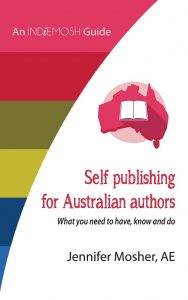 I have finally found out what it is like to be edited, and I learned quite a lot. For the past decade I have been editing and proofreading other people’s works and now I know what it feels like when the tables are turned.
I have finally found out what it is like to be edited, and I learned quite a lot. For the past decade I have been editing and proofreading other people’s works and now I know what it feels like when the tables are turned.
Last week I released Self publishing for Australian authors: What you need to have, know and do, and as part of that process (much earlier in the year) I sent the manuscript out to five beta readers for their feedback. One of these was my daughter, Ally, a graphic and web designer who co-runs IndieMosh with me, so her views were vital to make sure that I made sense when discussing our business practices. The other four beta readers were editors from a variety of backgrounds: Adam Finlay, Denise Sutherland, Paul Vander Loos and Sarah McCloghry. My brief was open: I just wanted them to beta read the book and let me know what they felt it needed, at whatever level suited them, as I understood that they each had their own commitments and were doing me a favour.
What resulted from the exercise was very interesting:
-
They nearly all picked up the same typos. Good start.
-
They nearly all missed the same typos. Bit of a worry, but very enlightening. While it reinforces the fact that no one is perfect, it also suggests that certain types of typo are harder to spot than others.
-
One person with a graphic design background (not Ally) provided some interesting and additional thoughts in their area of expertise. Very helpful.
-
One person with a more journalistic background defers to not using commas in figures less than 10,000. While this agrees with the recommendations of the Style manual for authors, editors and printers (the Australian editors’ bible), as an ex-accountant I can’t bring myself to have a mix of figures above 999 with and without commas, especially on the same page. So all the commas stayed, from 1,000 onwards.
-
At least one person reminded me that ‘etc.’ should have a full-stop after it as it’s an abbreviated Latin term. I have become so used to reducing punctuation that I have been using ‘etc’ without the full-stop. Eeek!
-
At least one noticed that I like using ellipses a lot – which I have noticed in other people’s writing but not my own. They were, however, correct …
-
More than one noted my enthusiastic use of exclamation marks! (I am in rehab for that one.)
-
Several noticed that I repeated myself a bit. Quite a bit. I struggled when addressing that as the book was designed to be one where you can dip in wherever you like, rather than having to be read in order from page 1, and so some repetition was necessary. However, I think if I give myself some more time away from it, the second edition may be a bit leaner in this respect.
-
Most commented positively on the same things.
- Ally, the youngest of all the beta readers, suggested toning back my ‘strength of expression’ in a few places. It was interesting that she found my tone a bit aggressive or potentially arrogant in a few spots. Not one of the other four commented in this manner, but on looking more closely at the paragraphs in question, I could see how they could be interpreted differently. I found it particularly interesting that it was the person closest to me, and who knows me best, who noticed the potentially offending tone.
-
One person looked at the manuscript at the structural level, making broader suggestions (while still picking up things at the detail level), while the rest worked at a more copy editing/proofreading level for the most part. This was exceedingly helpful as it gave me a wide range of feedback.
Some of the feedback was laugh-out-loud hilarious and I do think that, as editors, if we have a reasonably comfortable relationship with a client, it’s good to lighten our feedback with a bit of relevant humour here and there.
What pleased me most is that no one made me cry! All the feedback was helpful – whether I accepted it or not – and gave me the ability to think seriously about what was important to me as the author of the book.
It was a terrifying thought putting the book out there for five of my industry peers to comb over, but it was worth the exercise, not just for the book or for me as an author, but for me as an editor. I now know what it’s like to open that document with Track Changes showing and think, ‘Ermagherd, how did I write that?!’ or ‘How did I miss that?!’ or ‘What the hell was I thinking?!’ or ‘What do they mean by that?!’ But I am grateful to every one of them for dissecting my manuscript the way they did as every little mark, every little comment, gave me the chance to polish it in such a way that it’s still mine, but so much better now than when I sent it to them. There will be people who read it still and think, ‘Hhhmm … that could do with some work’, but I had to keep reminding myself that no matter how much time was spent on it, there will always be people who won’t love it.
When you publish a book, you’re baring your soul, your talent, your creativity and knowledge to the world in general. And no matter how many beta readers or editors you have, they’re not all going to see what changes should be made, and they’re not all going to agree on what changes should be made. There will be much common ground, but also room for many differing thoughts. And you don’t have to agree with all of their suggestions either, which is the beauty of self publishing – your book, your way.
But I have to say, my book is a much better product for having been seen by others first. And for that I thank them.

Thank you for sharing your experience with being edited. It must have been a bit scary!
Wonder how many writers are also in exclamation-mark rehab.
Happy writing and editing.
Desolie
Oh yes – exclamation mark rehab, ellipsis point rehab – en dash rehab – you name it!
Cheers
Jenny
Hi Jenny, this was very interesting. Can you expand on point 2, i.e. the types of errors less likely to be picked up by the editors?
Hi Charlotte
I’m glad you found it interesting – I found it an interesting process to go through.
The sorts of things that everyone missed were little errors such as:
… additional copies should require them … (missing ‘you’ after ‘should’)
… be likely to take chance on it … (missing ‘a’ after ‘take’)
One of fellow author’s … (missing ‘my’ after ‘of’)
A sentence with no closing bracket.
I have to admit, these were very minor items compared with some of the things that were queried and/or corrected, but it was interesting that not one in five people saw these. However, three of these examples were in the second half of the book, so perhaps everyone’s eyes were a bit tired by then! I also had the advantage of picking them up in a printed proof – the beta readers all read onscreen using Track Changes – and it does make a difference when things are on paper.
I suppose it helps us feel more relaxed about not being perfect. As an editor, I am terrified of missing something, but have to accept that I will happen – and that I won’t be the only one!
Cheers
Jenny
That was an interesting read, Jenny. Thanks so much for sharing your insights. I’m pleased Charlotte asked the above question, because I was curious too. I love the expression ‘strength of expression’! Oh look, there’s an exclamation mark ??.
Ha ha – they’re sneaky little fellows, pop up when you least expect them, don’t they?! 🙂
Yes, ‘strength of expression’ was the only way I could describe it. I’m glad you like that – that’s an added bonus!
It was interesting as I wouldn’t have thought Ally would have sensed that, being my daughter, having grown up and lived with me – I would have thought she’d have been a bit de-sensitised to my personality. Apparently not!
That was entertaining and enlightening, thank you, Jennifer. It just goes to show the value of obtaining opinions from people from different walks of life, about your work. And, of course, the value of well-chosen beta readers.
Absolutely, Sally-Anne! You need different types of people, with different interests and backgrounds and education.
And they need three things in common: a good understanding of (or, better still, training in), spelling, punctuation and grammar; a willingness to help; and honesty. Without those three, you won’t get the help you need.
I’m currently studying writing and being edited is the scariest thing. Typos I can handle but changing the whole direction is another thing. When you get three opinions: 1 said – leave it and just tweak it; 2 said – turn left, 3 said – do a backflip and sit in the mud! Well not quite like that, but three vastly different opinions. Maybe a non-fiction work would not court so much controversy…
Hey Nette
Being edited can be confronting – especially when you end up with three totally contradictory opinions! I do think non-fiction could still attract the same issue, but just in different ways.
We’re all different as people, and so different editors and beta readers will see things differently. I think with the three different opinions, perhaps consider what you could do for each, and then whichever one feels right in the gut is the one you probably need to work towards.
The hard part about being edited is remembering what you’re trying to achieve – what is your story all about? What would happen if you adopted the second or third idea? Would either of them make it a better book or ruin it for you? Or would either or one of them help the reader have a better experience?
Sometimes there’s no right answer. And sometimes, even the experts are wrong. Look at how many publishers knocked back Harry Potter. And I would have considered doing the same if it had been brought to me. I would have thought it far too long and involved for modern youngsters. But I would have been very, very wrong!
So keep an open mind but also listen to your gut. It’s your story at the end of the day and you have to be happy with it.